- Home
- Carolyn Wells
In the Onyx Lobby Page 10
In the Onyx Lobby Read online
Page 10
CHAPTER X
Seek the Women
Late that night,--in fact it was about midnight, when the onyx lobby waspractically deserted save for an occasional late home-comer,--the twodetectives arrived for a confab with Bob Moore.
This greatly pleased the night porter for he hoped to be looked upon asa sort of assistant detective, and felt sure he could be of valuablehelp.
"You know, Moore," Gibbs began, "there are people who are lookingaskance at you, with a sort of half-formed suspicion that you know moreabout this thing than you have told. But I don't think that,--at least,I think you are willing to tell all you know, if you haven't alreadydone so. How about it?"
"Why, it's this way, Mr Gibbs. I am ready to tell all I know, and Ithink I have done so, but you can't expect me to tell what I suspect orsurmise or imagine. Can you, now? It might lose my place for me. Also, Imight injure an innocent person."
"I think," spoke up Corson, "you ought to tell us anything you suspect;it need go no further and if your suspicions are mistaken ones, theycan't harm the innocent."
"Well, then, I've got my eye on two of the chambermaids. They are greatchums, and one is on the seventh and eighth floors, the other on theninth and tenth. But floors don't matter; they chum around with eachother. Well, these two are the most canny old hens you ever knew.They're no chickens, and they have an eye out for the main chance allthe time. I mean they toady to the people who are rich or generous andthey scamp their work in places where they're not 'remembered.' Alsothey're specially attentive to the work of gentlemen who live alone.Why, Sir Herbert's rooms were kept as neat as a bandbox. And Mr Goodwinand Mr Vail,--they're both up on the tenth,--their rooms are immaculate.And yet, there's the Prall place neglected, 'cause Miss Prall don'tbelieve much in fees, and as for the Everetts, why, _she_ says she can'tget anything tended to!"
"Doesn't she 'remember' the housemaid, either?"
"Some; but in her case, it's more her sharp tongue and her fussy ways.Miss Prall, now, she's on the outs with Mrs Everett,--I know that,--butshe's decent-spoken to the maids. Only, she's stingy. Well, what I'mgetting at is, those two chambermaids are regular devils, if you ask me,and though Sir Herbert Binney was generous enough when he liked the workpeople, he didn't like his chambermaid, and he was as ugly as Cain toher. Used to call her down for the least thing and laid her out cold ifshe sauced him back."
"Then you think the 'women' might have referred to these two maids?"
"That's just it. I only think it may have done so. I've no evidenceexcept that they are more the type of women it seems possible tosuspect. These little girls,--it don't seem's if they could manage thedeed. But Jane and Maggie could have worked it if they'd wanted to.They're big, husky women and they've dogged, sullen tempers. And, ofcourse, what made me think most about it, was your finding thatpaper-knife of Miss Prall's. Now, if Miss Prall had killedBinney,--which is ridiculous on the face of it!--she'd been too cute toleave the knife around, but those ignorant chambermaids----"
"I don't agree," Corson interrupted. "The woman,--which one is thePrall's chambermaid?"
"Maggie."
"Well, Maggie then,--she couldn't have taken the knife from Miss Prall'stable without its being missed, and Miss Letitia is not the one to loseher property without a word! No, sir, that paper-knife points straightto Letitia Prall. Moreover, she had motive; she wanted the old gentlemanout of the way for two reasons. First, so Pet Nephew could inherit theold man's money, and, second, because the uncle was in favor of themarriage of young Bates with Miss Everett, the daughter of Miss Prall'sdeadly enemy!"
"Where'd you get all that dope, Corson?" Gibbs said in astonishment.
"Partly by quizzing round and partly by putting two and two together.Anyway, it's all true, the motives, I mean. Now, confidentially, justamong us three here, could she have done it? I mean, was it physicallypossible?"
"Anything is possible for Miss Prall," said Moore, quite seriously. "Sheis a Tartar, that lady is. And whatever she sets out to do, shedoes,--irrespective of whether it can be done or not!"
"I mean this. Could she have come downstairs from the eighth floorwithout being seen----"
"Of course she must have been seen," broke in Moore. "Whether she camedown in the elevator or walked down the stairs she must have been seen.She could have come down the servants' stairs, but that would have beeneven more conspicuous."
"At two in the morning?"
"No; there'd probably be no servants around then."
"So she could have done that, and waited, say, outside,----"
"Oh, nonsense! Waited out in the street at that hour?" Gibbs demurred;"that's too much to swallow!"
"But she may have known just about the hour Sir Binney expected toreturn. Anyway, suppose she did do that, and then, having succeeded, sheslipped back to the servants' entrance and hid the knife where it wasfound and then scuttled back upstairs the way she came."
"But the paper said, 'women,'" mused Moore.
"That companion person was with her," declared Corson, triumphantly."Those two are great in team-work. Miss Gurney doubtless acted as scoutand kept a lookout and Miss Prall did the deed."
"Oh, Mr Corson, I can't think it!" exclaimed Moore.
"Because you know Miss Prall only as a tenant of this house. You knownothing of what she may be capable of when her spirit is fired. And asfar as I'm concerned, it's far easier to believe that she did it, thanthat it was the work of some foolish little girls scarcely out of theirteens! Miss Prall is not only a strong-minded woman, and astrong-muscled woman, but she has a strong personality with practicallyillimitable powers of loving and hating. For her the sun rises and setsin young Bates, and in the other direction she is all wrapped up in herhatred of Mrs Everett.
"What's Mrs Everett got to do with the murder?" growled Moore.
"Nothing, that I know of, but she works in this way. Her daughter is inlove with Richard Bates, and neither of the women will stand for themarriage of the two young people. Why, I think Mrs Everett and MissPrall would see their young charges dead rather than married to oneanother. Now, Sir Herbert Binney favored the match. Therefore Miss Prallwanted him out of the way. Again, he favored young Bates going into theBun business instead of sticking to his inventions. Therefore, again,Miss Prall wanted Binney out of the way. So, what would a woman of hercaliber and her determination do, but put him out of the way?"
"Plausible enough," and Gibbs thought deeply.
"And so, I'm asking Moore," Corson went on, "how he thinks Miss Prallcould have compassed her awful plan and he's solved any uncertainty bysuggesting the servants' staircase at an hour so late that it was almostcertain to be unused."
"I don't say I believe she did do it," Moore began, "but I have to sayshe could have done it that way. She must have known just about the timehe'd come home----"
"That's not difficult to assume," Corson defended his theory, "heprobably told her that. And she could have waited around some time,--itwas a mild night."
"But how could she be sure she'd have the chance in the lobby?" askedGibbs, his incredulity fast dwindling.
"Oh, she wasn't sure. She took a chance. I mean, she may have waylaidhim outside, don't you see, and kept him there talking until she sawMoore go up in the elevator with somebody. This place is so brightlylighted that any one outside could see that. Or they could have beeninside, standing in the shadow of the big pillars for a longtime,--unnoticed."
"Have you any clews?" asked Bob Moore of the detectives.
"Dropped handkerchiefs and such like?" asked Gibbs, mockingly. "No; andif there were footprints, they're washed away now. But those things areonly for story-books,--such as you're eternally reading, Moore."
"I do read a lot of 'em, and it's astonishing, but most always acriminal leaves some trace."
"In the stories,--yes. In real life, they're not so obliging. But let'slook at the spot. We might get an idea,--if nothing more tangible."
The three went along the lobby till they reached the pla
ce where SirHerbert had breathed his last. Marks had been drawn to indicate theblood spots that were so quickly washed off, and these still showedclearly. The body had been found crumpled on the floor, in the anglemade by the great square base of an onyx pillar and the wall.
They saw, of course, no traces of any personality, but as they lookedeach began to reconstruct the scene mentally.
"I think they were concealed here for some time," Corson said. "If theystood here talking, the pillar would partly shield them from view ofothers entering. Nor could they be easily seen by Moore, in the back ofthe lobby."
"Maybe," Moore agreed hesitantly, "but if Miss Prall and Sir Herbert hadcome in together I bet I'd seen 'em."
"Not if you were up in the elevator," said Corson.
"No; of course not. That might have been the case."
"And then, when you took Mr Vail up, was no doubt the moment she choseto stab him and immediately pulled out the knife and ran away."
"We know," said Moore, positively, "that whoever did it, did it while Itook Mr Vail up, and that the murderer then pulled out the knife and ranaway. But that's not saying it was Miss Prall. And I've got to have somesort of evidence before I'll believe it was. Her desire to be rid of SirHerbert isn't enough, to my mind, to indicate that she killed him. Canyou tie it onto her any more definitely?"
"Her ownership of the knife, and her making no effort to find it, thoughmissing, are evidence enough for me," said Corson doggedly. "And, how'dthose little chorus chickens get it, if they're the ones?"
"I don't think they're the ones," Moore declared; "but I do think it wasthose two chambermaids. They could get the knife from the Prallapartment easy enough, and maybe Miss Prall did question Maggie aboutthe missing knife and maybe Maggie gave a plausible explanation for itsdisappearance."
"Maybe and maybe and maybe not!" observed Gibbs, cryptically. "This sortof talk gets us no-where----"
"Yes it does," Corson interrupted. "It's shown us how Miss Prall couldhave done it. And when you remember that Sir Herbert declared with hisdying heartbeats that women did it, and when we have no other women withhalf as much motive,--those little girls' jealousies are puerile bycomparison,--I think we are bound to conclude we're on the right track."
"If so, let's forge ahead," and Gibbs nodded energetically. "What's thenext move?"
"Don't move too fast," advised his colleague. "And, too, we want tointerview those chambermaids. Though I think Miss Prall is at the backof the thing, she may have been aided by those women. They might havebeen paid----"
"Now, look here," put in Moore. "I know Miss Prall better than you twodo. And I know if she undertook a thing of this desperate nature, shenever called in any outside help. She'd be afraid to trust those women.And that companion of hers is all the help she'd want. No, sir, if thewomen Sir Binney recognized were Miss Prall and Miss Gurney, that's allthere was of them. Likewise, if it was those two chambermaids, that'sall there was of _them_. But they never combined forces; no, sir, theydidn't!"
"I believe that." Gibbs nodded his head. "Now, let's take a look at thispaper again."
The paper left by the dying man had been carefully placed between twosmall panes of glass, in order to keep it intact and undefaced.
As Gibbs studied the passe-partout, he said, thoughtfully, "We must makeup our minds what he meant in this second line. It's unintelligible, butwhat _could_ he have meant? 'Get bo----'"
"I think it means get both," said Corson, positively; "but it mayn't bethat at all. As it was the very last effort of his spent muscles, it isfar from likely that he wrote just what he meant to write. He might haveintended that second letter for a or o or g or, in fact, almost anyletter! He lost control of his fingers and the pencil fell away fromthem."
"All right; I grant you all that," Gibbs agreed. "But we've got to startsomewhere. Now we know women killed him; he states that. Next, if thisword is both, we know there were two women and two only."
"Marvelous, Holmes, marvelous!" guyed Corson. "And Miss Prall and MissGurney count up just two! Correct, so far."
"Don't be funny. The chambermaids in question number two also. And therewere most likely only two, for women don't go round murdering in squads.But the point is, he says, get both,--if the word is both. That wouldseem to imply that one is more probable as a suspect than the other, buthe adjures us to get the other one also."
"There's something to that, Mr Gibbs," and Bob Moore looked at thedetective admiringly. "Now, if it was a case of Miss Prall and MissGurney, they're so much together, that such a message would bepractically unnecessary. So it may point to the chambermaids. You see,Maggie is on his floor, but he may have meant that Jane, too, wasimplicated."
"Oh, rubbish!" cried Corson. "A dying man isn't going to use his lastgasp to tell the police to get a certain chambermaid! That word isn't'both' at all. It's something far more significant. I think it's a name.I think it's a name that begins with Ba or Bo. Now, I'm as well aware asyou two men are, that my own name begins with Bo and my girl's last namewith Ba. But I'm not afraid, for I didn't do it. I was upstairs at thetime, and anyway I'd no grudge against the old fellow. Nor did Julie doit. And he never would have called her Baxter, if she had! So, I saythat I think it represents some name, and all possible names ought to beinvestigated."
"The trouble is it might represent so many names," Gibbs said. "I thinkmyself that he might have meant to make a capital letter and onlyachieved a small one, but never mind that. Ba could be BabeRussell,--but I can't seem to think he'd take that method of accusation.If it had been a man who killed him he would be more likely to feelrevengeful."
"Good heavens, Gibbs!" and Corson's eyes opened wide; "I guess if you'djust been fatally stabbed by your lady friends, and had enough spunk totell that women killed you, you wouldn't hesitate at bringing a nameinto the limelight! I've had a hunch it was that Baby Doll allalong,--but it looked like an impossibility."
"So you see," offered Bob Moore, "you can't deduce much from that secondline. And we may be 'way off. It might have been meant for, 'Get busy'or 'Get Bob Moore to find the criminal,' or lots of things."
"This is no time for fooling, Moore," said Corson, gravely, "but you'reright that it's wasting time to puzzle over that phase of the message.We're lucky in having the clear direction as to the sex of thecriminal,----"
"Unless it's all faked," suggested Gibbs. "How about the murderer beinga clever man, who had this paper all ready, and brought it with him andlaid it beside his victim?"
"Not a chance," said Moore. "I've checked up that handwriting and it'shis. Mr Bates says so, and I've compared it to his writing,--lots of it.That's Sir Binney's fist, all right."
Feeling they had learned all they could from Moore, and also feelingdecidedly tired and sleepy, the two detectives went home and to bed.
Not at once to sleep, however, for each had lots of thinking to do andeach felt that there were more ways to look than had yet appeared.
But, also, each thought the Prall suspicion justified, and each plannedto keep a wary eye in that direction.
Next morning, after waiting till such an hour as he thought late enough,Gibbs went to see Miss Prall.
He found a visitor already there, and he was presented to Mrs Everett.
To his surprise, Miss Prall made the introduction as casually as if ithad been a meeting of social acquaintances, and Gibbs felt a littleawkward at being expected to join in a general conversation.
But he was alertly interested in meeting Mrs Everett, and especially incircumstances where he might hear or see some manifestations of the feudhe had heard of.
"My friend, Mrs Everett, is about to move away, so you're lucky tochance upon her here," Miss Letitia said, in honey-sweet tones.
"As to your luck, I express no opinion," said the other lady, "but as tomoving away, I've not the slightest intention of such a thing."
Mrs Everett was inclined to be fair, afraid of being fat and unwillingto admit being forty. She was pretty in a soft, faded way, and hervoi
ce, though low and pleasant, had a sharp tang to it, which, one feltsure, could increase at will.
"You said you would!" Miss Prall declared, "but I long ago learned toput no faith in your assertions."
"You're saying I lie?" asked Mrs Everett, and her voice was stillplacid.
"If the shoe fits, put it on," Letitia laughed. "Only, you can't blameme for saying that of you, when you know it's the truth."
"Dear friend," murmured Mrs Everett, "how can you think I'd go off andleave you while you're in such trouble? I feel I must stand by."
"That's quite like you! Don't lose a chance to gloat over any sorrow orgrief I may have!"
"Do you call it sorrow and grief? I didn't know you thought so much ofthe departed nobleman--he was a nobleman, wasn't he? Tut, tut, Letitia!and at your time of life! Well, I suppose it's habit that makes you setyour cap for any man you chance to meet."
"You always were the greatest for judging others by yourself, Adeline.You were the celebrated cap-setter of your day. Ever since you worriedpoor, dear Mr Everett into his untimely grave, you've pursued thehonorable business of cap-setting, alas! to no avail."
"Don't you dare call my husband dear! I'll let you know, Letitia Prall,he was not in the habit of calling you dear!"
"Tee hee," tittered Eliza Gurney. "Don't be jealous of Letty, MrsEverett. She's had more beaux than you ever saw, with all your yellowcurls and red--a little too red cheeks!"
"Hush, Eliza," admonished Miss Prall, "our caller will think we'requarrelsome neighbors. As a matter of fact, Mr Gibbs, we're----"
"Dearest enemies?" he suggested, smiling, for he saw he was expected torecognize the situation.
"Yes," assented Letitia with a nod at Mrs Everett that seemed to conveyall sorts of inimical intent, undiluted by friendliness.
Gibbs realized that these two women took such pleasure in theirbickerings and faultfindings that they really enjoyed their antagonism.
And Miss Eliza Gurney was equally interested in the exchange ofsarcastic repartee.
They kept on with their sparring until Gibbs began to feel not onlyuncomfortable but impatient.
"I called, Miss Prall," he began, but Mrs Everett interrupted:
"Oh, I know what for," she cried, clasping her fat hands, and giving anunpleasant little giggle, "to talk about the murder! Yes, yes, andplease don't mind me. I want to hear the details; have you found out whodid it? Who was it? Was it those sweet little dancing girlies? I can'tthink it!"
"Keep quiet, Adeline," said Miss Prall; "how you do run on! I shouldthink you'd have the tact to take your leave,--but you never had evenordinary good manners. I can scarcely invite you to depart, but I dofeel privileged to say you may go if you feel you must."
"Oh, I don't feel I must at all! On the contrary, I want to stay andhear the news. For I'm sure this gentleman has some news. I can see itsticking out all over him! Go ahead, sir, tell your story. I feel I'mentitled to be in the audience."
She settled herself in her chair and looked as if nothing less than areally severe earthquake would move her. Her big round eyes danced fromLetitia's face to the detective's. Her smile broadened as she enjoyedthe discomfiture of her enforced hostess. And she positively reveled inthe awkward and embarrassed silence that fell on all in the room.
Then Eliza Gurney said, "Adeline Everett, if you take my advice, you'llgo away before you're put out!"
"I've never taken your advice yet, Eliza, and I don't propose to beginnow. Also, you'd better not put me out, for if you do, I shall thinkthat what Mr Gibbs is about to reveal is something you don't wantknown,--something incriminating to some of your own people!"
Apparently she had heard something, Gibbs thought quickly, and he wasmore than ever anxious to get her away. But, not knowing how to managesuch an unusual type of womankind, he said instead that he thought heshould retire and make his call some other time.

 The Deep Lake Mystery
The Deep Lake Mystery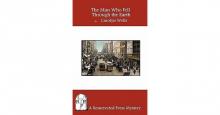 The Man Who Fell Through the Earth
The Man Who Fell Through the Earth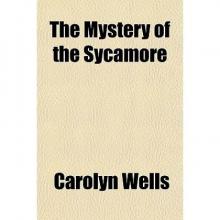 The Mystery of the Sycamore
The Mystery of the Sycamore The Mystery Girl
The Mystery Girl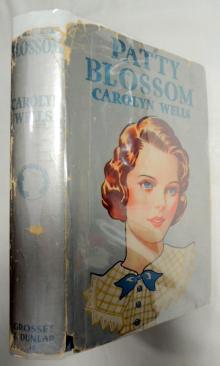 Patty Blossom
Patty Blossom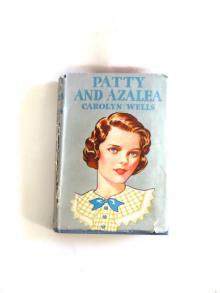 Patty and Azalea
Patty and Azalea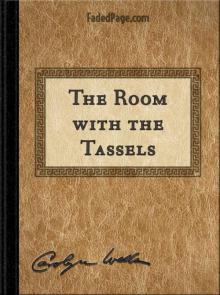 The Room with the Tassels
The Room with the Tassels The Vanishing of Betty Varian
The Vanishing of Betty Varian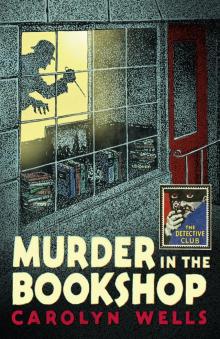 Murder in the Bookshop
Murder in the Bookshop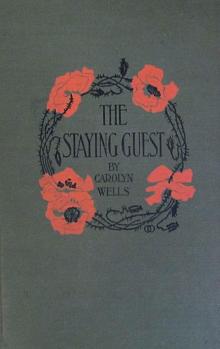 The Staying Guest
The Staying Guest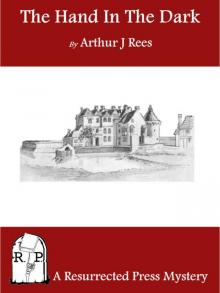 The Curved Blades
The Curved Blades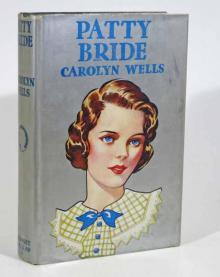 Patty—Bride
Patty—Bride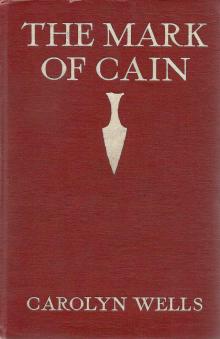 The Mark of Cain
The Mark of Cain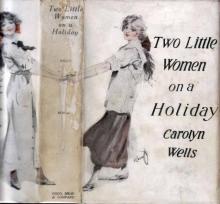 Two Little Women on a Holiday
Two Little Women on a Holiday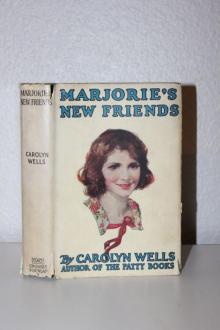 Marjorie's New Friend
Marjorie's New Friend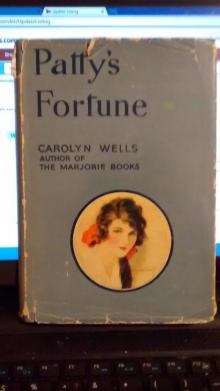 Patty's Fortune
Patty's Fortune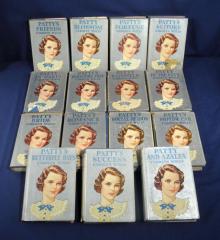 Patty's Social Season
Patty's Social Season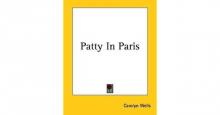 Patty in Paris
Patty in Paris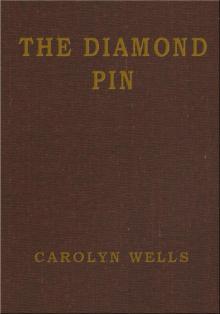 The Diamond Pin
The Diamond Pin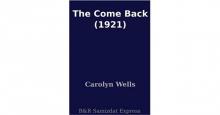 The Come Back
The Come Back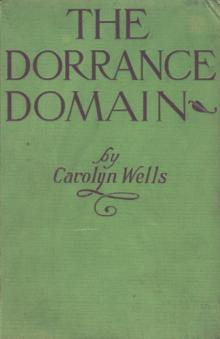 The Dorrance Domain
The Dorrance Domain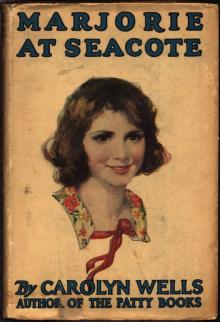 Marjorie at Seacote
Marjorie at Seacote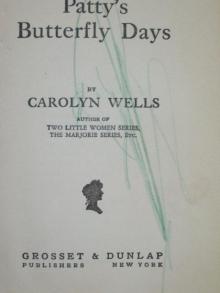 Patty's Butterfly Days
Patty's Butterfly Days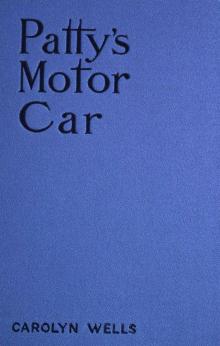 Patty's Motor Car
Patty's Motor Car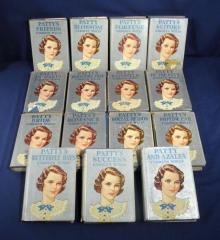 Patty's Success
Patty's Success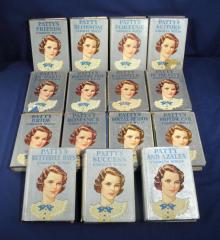 Patty's Suitors
Patty's Suitors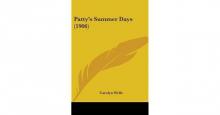 Patty's Summer Days
Patty's Summer Days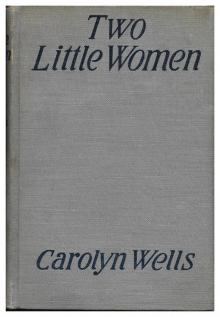 Two Little Women
Two Little Women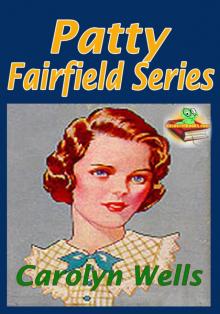 Patty Fairfield
Patty Fairfield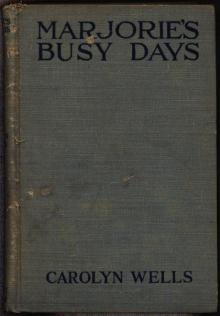 Marjorie's Busy Days
Marjorie's Busy Days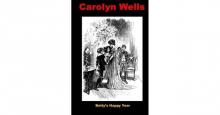 Betty's Happy Year
Betty's Happy Year In the Onyx Lobby
In the Onyx Lobby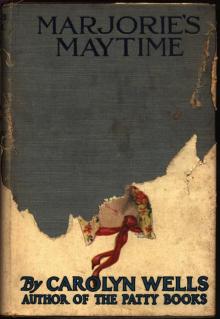 Marjorie's Maytime
Marjorie's Maytime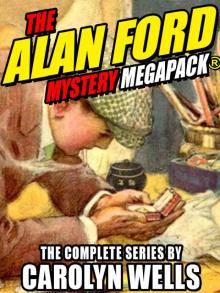 The Alan Ford Mystery MEGAPACK®
The Alan Ford Mystery MEGAPACK®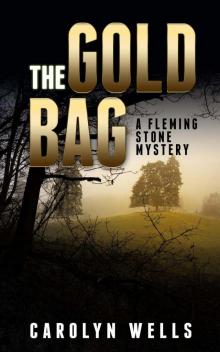 The Gold Bag
The Gold Bag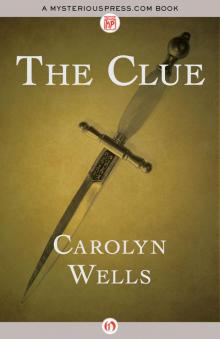 The Clue
The Clue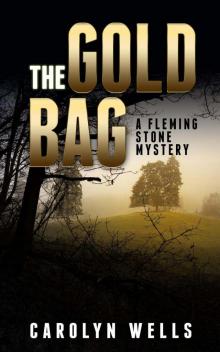 The Gold Bag : A Fleming Stone Mystery
The Gold Bag : A Fleming Stone Mystery